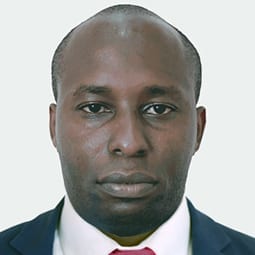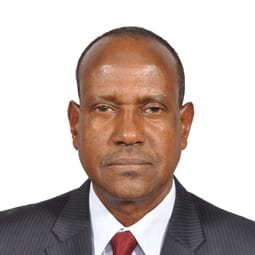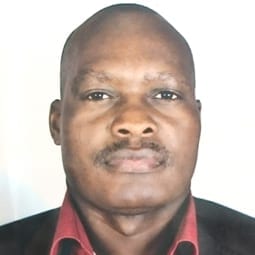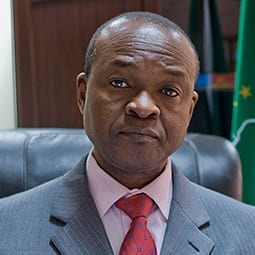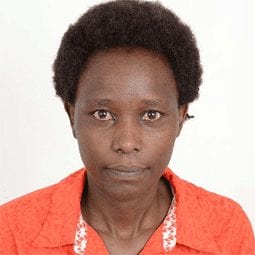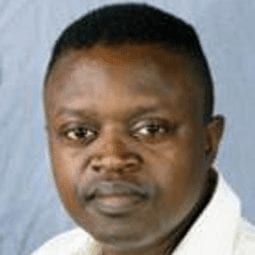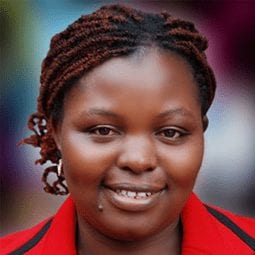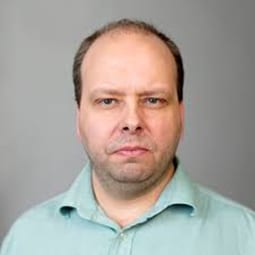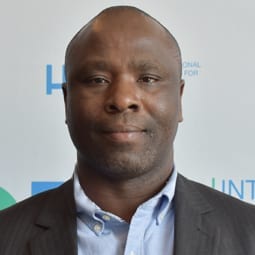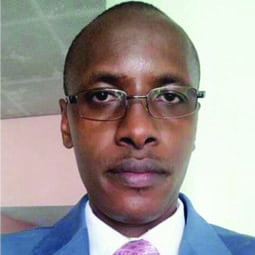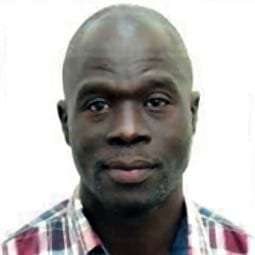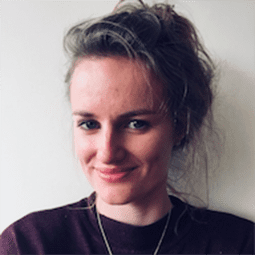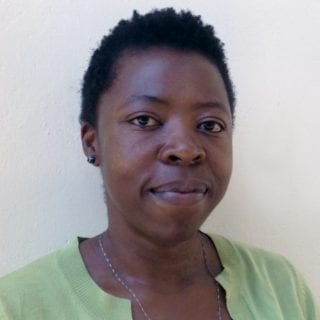Mumo Nzau, Ph.D.
Governance and Statecraft
Brig Gen (Rtd) Ahamed Mohammed, E.B.S.
Defence and Security
Stephen Mwachofi Singo
Peace and Security
H.E. Erastus Mwencha, E.G.H., M.B.S.
International Development
Elvin Nyukuri, Ph.D.
Environmental Governance
Jules Swinkels
Conflict Analysis
Emmanuel Kisiangani, Ph.D.
Political Governance and Democracy
Sellah Nasimiyu King’oro, Ph.D.
Social Cohesion
Brig Gen (Rtd) Ahamed Mohammed, E.B.S.
Associate Fellow Defence and Security
Justice Srem-Sai
Maritime Law
Prof. Stig Jarle Hansen, Ph.D.
International Relations and Terrorism
Nelson Alusala, Ph.D.
Security and Transboundary Governance
Patrick Kasyula, Ph.D.
National Security, Leadership, and Governance
Kizito Sabala, Ph.D.
Human Security and International Relations
Annabelle Poelert
Political History and International Relations
Roselyne Omondi
Associate Director, Center for Climate Change, Migration, and Development
Mumo Nzau, Ph.D.
Overview
Dr. Mumo Nzau is a Fulbright scholar who holds a Doctor of Philosophy in Political Science and a Master of Arts in Political Science, both from the State University of New York at Buffalo (USA). He also holds a Master of Arts in International Relations from United States International University – Africa (Kenya), in addition to other graduate-level training in the field of Peace and Conflict Studies from Masinde Muliro University of Science and Technology (MMUST).
Dr. Nzau is a Lecturer at the Institute of Diplomacy and International Studies at the University of Nairobi (Kenya) and he has been a Senior Lecturer of Political Science at the Catholic University of Eastern Africa (Kenya), Adjunct Faculty at the United States International University – Africa (Kenya), as well as in the Department of Political Science and Public Administration in the University of Nairobi (Kenya).
He is a key resource person in the Foreign Affairs, and Internal Security and Defence dockets in Kenya. His Consultancy and Research specialties include National Security and Defence Strategy; Conflict Resolution and Management; and Governance and Development – areas of specialization on which he has numerous peer-reviewed published works in the form of books, book chapters and journal articles.
Brig Gen (Rtd) Ahamed Mohammed, E.B.S.
Overview
Brigadier General (Rtd) Ahamed Mohammed holds a Master of Arts in Defence Studies from Kings College, University of London and a Master of Arts in International Studies from the University of Nairobi. He is a Fellow of the Kenya Institute of Management and his awards and decorations include the Elder of the Order of Burning Spears (E.B.S).
Brig Gen (Rtd) Mohammed has served in a variety of command and staff positions in his 37-year career in the Kenya Defence Forces. He has worked with the United Nations Protection Force (UNPROFOR) in the former Yugoslavia as a Deputy Senior military Observer; a military assistant to the Chief of the General Staff (Kenya Defence Forces); and as a Directing Staff – both at the Defence Staff College (Kenya) and at the Joint Services Command and Staff College, (JSCSC), Bracknell, and later Shrivenham, United Kingdom.
He was also a Defence Advisor, Permanent Mission of Kenya to the United Nations in New York (2001–2004); Chief of Personnel, Kenya Army Headquarters in Kenya (2004); Commandant, International Peace Support Training Centre in Kenya (2005); Brigade Commander, Kenya Army Corp of Engineers in Kenya (2008–2010); and later as Chief of Operations, Training and Plans, Kenya Army Headquarters in Kenya; and as Commandant (CEO), Defence Forces Memorial Hospital, Nairobi (Kenya).
Between 2013 and 2016, Brig Gen (Rtd) Mohammed served as Chief of Staff, Office of Military Affairs, Department of Peacekeeping Operations, United Nations Headquarters in New York, becoming first Kenyan and African to hold this position following a competitive international selection process. As Chief of Staff, he formed the Kenya-UN Club, bringing together all Kenyans working at the UN, serving as the Founder Chairman. He is currently the Director of Training and Doctrine Command (TRADOC) at the Kenya Defence Headquarters in Kenya.
Stephen Mwachofi Singo
Stephen Mwachofi Singo is a doctoral candidate in Political Science at Maseno University (Kenya). He holds a Master of Arts in International Relations from the University of Nairobi (Kenya), and Bachelor of Arts in Political Science from Moi University (Kenya). He has also successfully completed professional courses in Peacebuilding; Diplomacy, Project Management, Monitoring and Evaluation (M&E) in Kenya, Switzerland, Sweden, South Africa, and Austria.
He is a Lecturer in the Department of Political Science and Public Administration at the University of Nairobi (Kenya) where he teaches Security Studies and Comparative Politics. He has also taught at Moi University (Kenya).
He has over 17 years of experience in project management in the fields of Small Arms and Light Weapons (SALW) control, disarmament, and peacebuilding at the national, regional, and international levels. From 2002-2006, Singo served as Research and Peacebuilding Programme Coordinator at Security Research and Information Centre (SRIC), Kenya, where he coordinated research projects focusing on illicit small arms proliferation in the Karamoja cluster (Kenya, Uganda, Sudan and Ethiopia).
Singo was the Director of Peace and Security Programme at the International Conference on the Great Lakes Region (ICGLR) based in Bujumbura (Burundi) from 2007 to 2014. In this role, he oversaw the implementation of six (6) peace and security projects in 12 countries. He also served as a member of the African Union Steering Committee on SALW representing ICGLR from 2009-2014. From 2012 to 2013, he was Chief of Staff of the Facilitation Secretariat of the Peace talks between the Government of the Democratic Republic of Congo (DRC) and M23 rebels held in Kampala (Uganda), under the auspices of the ICGLR.
He has been involved in international arms control and disarmament processes over the last 10 years, notably the Arms Trade Treaty (ATT) and the United Nations Programme of Action on Small Arms and Light Weapons (UNPoA). He is currently serving on the Editorial Board of the Arms Trade Treaty Monitor and is involved in Control Arms and International Action Network on Small Arms (IANSA).
His research interests include the link between illicit small arms proliferation and development. He is currently a consultant at Security Research and Information Centre (SRIC) (Kenya), and International Peace Support Training Centre (IPSTC) in Nairobi (Kenya).
H.E. Erastus Mwencha, E.G.H., M.B.S.
Ambassador Erastus Mwencha is the immediate former Vice Chairperson of the African Union Commission (AUC). He was elected to this position in January 2008 by the Heads of State and Government of the 54 Member States of the African Union, and re-elected to the same position in July 2012. Prior to his election at the AUC, he worked at Common Market for Eastern and Southern Africa (COMESA) for over 25 years, and served as its Secretary General for 10 years.
Amb. Mwencha contributed to the transformation of the regional body into a viable economic integration entity, with the largest free trade area (FTA) in Africa. He was particularly instrumental in contributing to the expansion of intra-COMESA trade, developing programs for private sector cooperation and trade with the rest of world, spearheading regional hard and soft infrastructure programs in transport, communication, and energy. He also developed the continental negotiating position for the Doha Round of Negotiations of the World Trade Organization, Economic Partnership Agreements (EPAs), African Growth and Opportunity Act (AGOA) and actively supported the programs to integrate women in development.
Amb. Mwencha has also held several senior roles within the Ministry of Industry in Kenya.
Elvin Nyukuri, Ph.D.
Overview
Dr. Elvin Nyukuri holds a Doctor of Philosophy in International Development Policy and Practice from The Open University (United Kingdom) and a Master of Arts in International Studies and Diplomacy from University of Nairobi (Kenya).
Dr. Nyukuri is a Researcher in Environmental Governance, Climate Resilience and Natural Resource Conflicts. She is also a Lecturer in Environmental Diplomacy at the Centre for Advanced Studies in Environmental Law and Policy (CASELAP)-University of Nairobi. She is actively engaged in multi-disciplinary research including environmental governance and policy, climate change, and food security while working at African Centre for Technology Studies (ACTS) for nearly a decade.
She currently serves as a program committee member of the Leading Integrated Research Agenda for Africa, 2030. She has also served as a reviewer of the Climate Impacts Research Capacity and Leadership Enhancement program (CIRCLE) by DFID. She has consulted for International Organizations including IIED, ODI, Practical Action, IUCN, World Agro-forestry Centre, Pegasis and International Universities: IDS Sussex, University of Reading, LSE, and University of Life Sciences in Norway. She continues to inform policy through research and teaching.
Jules Swinkels
Overview
Jules Swinkels holds a Master of Arts in Military Strategic Studies from the Royal Dutch Defence Academy (The Netherlands) and a Bachelor of Arts in Political History and International Relations, with a minor in Islamic Studies from Utrecht University (The Netherlands).
Previously, he served as research lead for an advocacy campaign in Nairobi, Kenya, conducting interviews and focus group discussions on abuse of power in Kenya’s counter-terrorism strategies. Additionally, he did research on the role of narratives and counter-narratives on identity in Kenya, and how proper narratives can serve as defence against human rights violations in counter-terrorism operations.
Swinkels also co-founded ‘De Focus’, a Dutch non-profit foundation aimed at strengthening the relationship between society and scholars by transforming academic articles into challenging short stories.
His specialties include Framing and Influencing; Conflict; War; Strategy; and International Relations. He currently serves as a Research Fellow at the HORN International Institute for Strategic Studies.
Emmanuel Kisiangani, Ph.D.
Overview
Dr. Emmanuel Kisiangani holds a Doctor of Philosophy in International Relations from the University of the Witwatersrand (South Africa); and a Master of Arts in Diplomacy and International Studies from the University of Nairobi (Kenya). He currently lectures at the Institute of Diplomacy and International Studies, University of Nairobi (Kenya) on International Conflict Management, Theory and Practice of Security and Energy; and International Relations.
Dr. Kisiangani has previously worked in various research and teaching capacities in South Africa and Kenya. His areas of research interest include Conflict Analysis and Early Warning; Political Governance and Democracy; Radicalization; Violent Extremism and Terrorism; International Conflict and Peace Building; and Transitional Justice and Diplomatic Discourse. Dr. Kisiangani also has a passion for wildlife and environmental conservation.
Sellah Nasimiyu King’oro, Ph.D.
Overview
Dr. Sellah Nasimiyu King’oro holds a Doctor of Philosophy in Peace and Conflict Studies from Kisii University (Kenya); a Master of Arts in International Studies from the University of Nairobi (Kenya); a Bachelor of Education (Arts) from Maseno University (Kenya); and a Bachelor of Laws from Mount Kenya University. She also holds two postgraduate diplomas from Bradford University (United Kingdom) and Chulalongkorn University (Thailand).
Dr. King’oro is a researcher with more than fourteen years’ experience in peace, social cohesion, social justice, and social policy research. Currently, she is the Head of the Research, Policy and Planning Department of the National Cohesion and Integration Commission where she has worked for more than seven years. Prior to her appointment at NCIC, she was a researcher at Development Policy Management Forum, a Programme officer at Peace and Development Network and a chairperson of the Conflict Analysis Group at the National Steering Committee of Peace Building and Conflict Management in the office of the president.
She is a Rotary Peace Fellow and a Chevening Fellow. She was appointed as the Global Peace Index ambassador in 2015 by the Institute for Economics and Peace (USA) following her effort in leading the development of the 2013 social cohesion index for Kenya. She is also the President of Rotary District 9212 Alumni Association which covers Kenya, South Sudan, Ethiopia and Eritrea. She has published several peer reviewed articles on peace, governance and democracy and has presented unpublished papers in a number of international and national conferences.
Brig Gen (Rtd) Ahamed Mohammed, E.B.S.
Academic Qualifications
- Master of Arts in Defence Studies from Kings College, University of London
- Master of Arts in International Studies from the University of Nairobi
Areas of Specialization
- Defence and Security
Justice Srem-Sai
Overview
Justice Srem-Sai holds postgraduate law degrees from Cardiff School of Law & Politics; Harvard Law School; and undergraduate from University of Ghana. He also holds a Qualifying Certificate in Law from the Ghana School of Law.
Srem-Sai is currently a Lecturer at the Ghana Institute of Management and Public Administration (GIMPA (Ghana) where he teaches law. His research focuses on the interface between human rights, law and development.
Justice is the Founding-Partner at Archbridge Solicitors, an Accra-based African business regulation and compliance advisory firm.
Prof. Stig Jarle Hansen, Ph.D.
Overview
Prof. Stig Jarle Hansen holds a Doctor of Philosophy in International Politics from the University of Wales (United Kingdom). He is a Professor, and Head of International Relations program at the Norwegian University of Life Science. He has worked as a Risk Analyst, Lecturer and Researcher, as well as as a court-appointed expert in several international security-themed cases. His areas of research include organized crime; religion and politics (including religious terror) and political theory, with a special interest in the British idealist and Islamic political thought processes.
Geographically, his main focus is in the wider Red Sea region, Yemen, Somalia, Eritrea, Ethiopia, and Kenya. Between 2005 and 2014, he conducted annual field research in Mogadishu as well as in the Middle East. His latest book, ‘Al-Shabaab in Somalia’ was critically acclaimed by Foreign Policy and The Economist, amongst others. Prof. Stig is a world expert on Islamism in the Horn of Africa and the Shabaab Group, and has commented for CNN, BBC, Al Jazeera, Reuters, CCTV 4 and many other international media outlets.
Nelson Alusala, Ph.D.
Overview
Dr. Nelson Alusala holds a Doctor of Philosophy in Political Science from the University of Pretoria; Master of Arts in International Relations from the University of Nairobi (Kenya); and Bachelor of Arts in French and Secretarial from Kenyatta University (Kenya).
Dr. Alusala is currently one of six experts mandated to monitor the UN Sanctions Regime in the Democratic Republic of Congo where he is in charge of natural resource and finance cluster. He has previously served in the same capacity in the UN Panel on Liberia, under the UN Security Council Resolutions 1819 (2008) on Liberia; followed by three consecutive appoints to the DRC under UN Security Council 1952, 2021, and 2078.
Dr. Alusala has also served in various capacities as a consultant for the Danish Refugee Council (DRC) in South Sudan; for the Deutsche Gesellschaft für Internationale Zusammenarbeit (GIZ) on arms control initiatives in Africa, and for Action on Armed Violence (AOAV) on border security and trafficking in the Great Lakes region among others.
His current research is on security and transboundary governance, with a focus on the impact of regulatory instruments on the governance of natural resources exploitation and the wellbeing of local communities in Africa. He is also engaged in conflict risk analysis, disarmament and the promotion of practical policy formulation and implementation. He has published numerous reports, monographs, and policy briefs.
He is a member of the Wellbeing Economy in Africa (WE-Africa Lab) Action-research Network as well as a member of the African Borderlands Research Network (ABORNE). Dr. Alusala is a post-doctoral research fellow at the Centre for Governance Innovation (GovInn).
Patrick Kasyula, Ph.D.
Dr. Patrick Kasyula is a Partnership for Africa’s Next Generation of Academics (PANGeA) fellow. He holds a Doctor of Philosophy in Leadership and Governance from Jomo Kenyatta University of Agriculture and Technology (Kenya); Master of Arts in Political Science and Public Administration; and a Bachelor of Arts in Political Science and Public Administration – both from the University of Nairobi (Kenya).
Currently, Dr. Kasyula teaches at the University of Nairobi in the Department of Political Science and Public Administration. He has consulted on devolution and governance, and has served as member of the Taskforce on Devolution in Kenya. He has also consulted with the United Nations Economic Council on Eastern Africa on Decentralization, Institutionalization and Structural Transformation Study as an expert on Governance. Previously, Dr. Kasyula worked with the Government of Kenya in various capacities, key among them, as the pioneer International Labour Officer at the State Department of Youth Affairs.
Dr. Kasyula has trained in International Development, Disaster and Relief Management in Africa, Project Management, Monitoring and Evaluation of Development Projects, Legislative and Policy Drafting, National Policy Formulation and Advanced Strategic Planning.
His research interests include political economy, leadership and governance in Africa, Horn of Africa and Middle East politics, and national security. He has published in the areas of devolution, public participation, civic education, decentralization and structural transformation, institutionalization and democratic governance.
Kizito Sabala, Ph.D.
Dr. Kizito Sabala holds a Doctor of Philosophy in International Studies; Master of Arts in International Studies; and Bachelor of Arts in Economics and Sociology, all from the University of Nairobi (Kenya). He also holds a Master of Arts in Peace and Security Studies from Addis Ababa (Ethiopia). He has over 20 years of professional engagement on matters of peace and security that includes the Inter-Governmental Authority on Development (IGAD).
Dr. Sabala has also consulted for the Government of Kenya East African Community (EAC), Common Market for Eastern and Southern Africa (COMESA) and the European Union. He previously served as the Head of the IGAD Liaison Offices in Juba (South Sudan), and Nairobi (Kenya). Dr. Sabala is a member of the African Peace Network (APN) and the American Political Science Association. He has gained deep and extensive knowledge of the region and its adjacent environs. He is currently a lecturer at the Institute of Diplomacy and International Studies, University of Nairobi, National Defense College and Defense Staff College. He is also an Adjunct lecturer at the Strathmore University. Previously, Dr Sabala has served as an adjunct lecturer at the United States University Africa (USIU-A) and Technical University of Kenya (TUK).
His recent publications include The IGAD Strategy on Counter Terrorism and Violent Extremism (2018); Human Rights and Countering Terrorism (2018); A Policy Brief entitled Revisiting the Dismissal of the UNMISS Force Commander in South Sudan published by APN/Social Science Research Council, Briefing Note, Number 10, 2017; South Sudan 2015 Peace Agreement and Women’s Participation by Indiana University Press, April 2017; Climate Change and Migration in the Horn of Africa: A Case of the Pastoral Communities in 2012; Ending the Turbulence: Lessons from the IGAD-Mediation in Sudan in 2012; Sudan: Beyond the 2011 Referendum, in the African Journal for Peace and Security; Extra Regional Inputs in Promoting (in) Security in Somali, in R. Sharamo & B Mesfin (eds) in Regional Security in the Post-Cold War Horn of Africa, ISS Monograph 178, April 2011.
Dr Sabala’s expertise and interests include regionalism, human security, energy and environment international relations, international mediation and negotiation, international conflict management, and peace and security studies.
Annabelle Poelert
Annabelle Poelert holds a Master of Arts in International Relations and a Bachelor of Arts in Political History and International Relations, with a minor in Development Geography, both from Utrecht University (The Netherlands). She currently works at Akvo Foundation where she is the Project Manager; and Planning, Monitoring and Evaluation (PME) specialist.
Annabelle has experience in designing and setting up monitoring systems for programs and projects in the areas of civil society; biodiversity; agriculture; and WASH throughout Eastern and Southern Africa. She specialises in the Theory of Change methodology for program design, and has experience in using both quantitative and qualitative monitoring tools, for tracking progress of projects and measuring results.
Her research interests include Theory of Change; monitoring framework design; survey design; and design of large-scale (multi country) monitoring systems.
Roselyne Omondi
Academic Qualifications
- Erasmus Mundus Master of Arts in Journalism, Media and Globalisation from Aarhus University, Danish School of Media and Journalism (DMJX), (Denmark) and Swansea University (United Kingdom)
- Erasmus Mundus Master of Arts in International Humanitarian Action from Rijksuniveriteit, Netherlands.
- Bachelor of Arts in English Language and Sociology from Kenyatta University, Kenya.
- Postgraduate Education in: Peace Research from University of Oslo and Peace Research Institute Oslo (Norway), Terrorism and Counter-Terrorism: Theory and Practice from Leiden University (The Netherlands), Advanced Grammar, Advanced Academic Writing, Research Writing, Critical Thinking, and Comprehensive Writing from Swansea University (United Kingdom); Development Policies and Children’s Rights (Finland); First Aid, Security, Safety and Survival in the Field (Germany); Basic and Advanced Security in the Field (Kenya).
Areas of Specialization
- War, Armed Conflict, and Terrorism
- Peace Research
- Migration Research
- Quantitative and Qualitative Research Methodologies
- Research Visualization (including Conflict Mapping)
- Project Management (including Proposal Writing, and M&E)
- Journalism, Media, and Communication
- Writing (Research or Academic, Journalistic, and Creative – Generalist, Specialist)
- Editing and Proofreading
- Publishing
- International Development
- Humanitarian Action
- Training (Peace and conflict, crisis communication)
Professional Membership
- Devex International Development (Devex)
- NOHA Network on Humanitarian Action
- Media Council of Kenya

